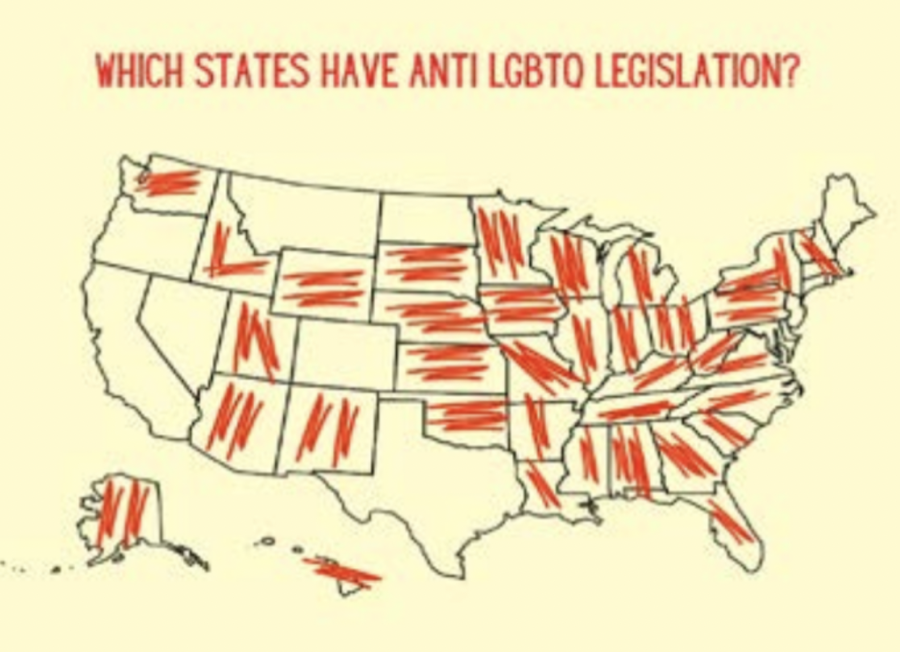The Effects of Anti-LGBTQ+ Legislation
April 9, 2022
More legislative laws have been passed throughout the country that have changed the lives of those in the LGBTQ+ community. Whether it is more of a direct impact or has affected those around them, the passing of these bills has impacted every member of the community. One of the most notorious of these legislations was passed in the state of Florida, signed off by the Governor Ron DeSantis and formally titled the Parental Rights in Education bill, HB (House Bill) 1557. This bill restricts educators from teaching anything regarding sexual orientation to children third grade and below. For many members of the LGBTQ+ society, this has been perceived as being targeted towards those with any sexual orientation other than straight. The anti-LGBTQ+ agenda that exists is being pushed more with this bill, which only continues to harm individuals. The lack of representation is associated with hostile school environments and a decline of mental health among LGBTQ+ youth, which can lead to more detrimental situations for them.
Along with this bill being passed, there are multiple other anti-LGBTQ+ bills that have been introduced or are in the process of potentially being passed by other states. These are being viewed as hurtful and a means to move backwards in LGBTQ+ acceptance in this country by those in the community.
Along with HB 1557, a few other legislative acts are being viewed as anti-LGBTQ+ by the public because of the restrictions that it places on members of the LGBTQ+ community.
One of these is a bill that was passed in Arizona titled Children Deserve Help Not Harm Act. This bill prohibits gender reassignment surgery for any individual under the age of 18. Critics said that these restrictions could increase mental health issues and increase suicide risk. A
sponsor of the bill, Senator Warren Peterson, said the intention was to protect transgender youth from making irreversible changes to their body.
Along with this, Missouri has pushed a bill into committee that will be called, Save Women’s Sports Act. This act will ban individuals who were assigned male sex at birth from parcipating in female athletic sports in middle school, high school, and postsecondary teams. Senator Tony Luetkemeyer, a supporter of the bill, said that he believes it creates an uneven playing field because of the biological components involved. Senator Greg Razer said that the target on transgender youth who want to particpate in sports growing up is unfair.
“Maybe we don’t pass laws about something we don’t understand and maybe we shouldn’t pass laws about something we don’t understand especially when it affects kids,” Razer said.
On the university campus, students have been vocalizing their opinions on some of these new legislatives. Kendra Key, a senior political science major, spoke on her feelings about these recent changes and the passing of these new acts.
“Personally, I’ve felt hurt by it, and I think that may go for a lot of people in the community,” Key said. “However I believe it’s also motivated a lot of us to keep fighting and is evidence that fighting for our rights and equality is still something we have to do every day. It’s upsetting to see steps back after so much hard work and energy has been put in by the community, both now and during the beginning of the gay rights movement. It’s also a bit scary to not know what the laws may be in a few years and not knowing if I’ll have the same rights I do now or hope to have later.”
Given the new changes regarding LGBTQ+ acceptance in various states, pride month in the United States could bring in a new atmosphere this year.
“Because I have seen this bill motivate the continued fight for equality, I would hope that that would be reflected during pride.” Key said. “I think that many of us in the community feel the need to remind people and especially legislators that we will continue to be persistent and fight for the rights we deserve.”
Despite the wavering support from the political world, within the university, many students are standing with the LGBTQ+ individuals in Milledgeville. Milledgeville resident, McKenzie Riezinger, explained how she has felt supported in her community and the improvements she would like to see moving forward.
“Everyone I know has supported both me and Abby, my girlfriend, in these times. As far as doing something to help the LGBTQ+ community,” Riezinger said. “I think there’s a lot of things people could do. For one, people can stop being so arrogant and realize that it’s 2022. People need to realize that us in the LGTBQ+ community just want to have a normal life like straight people do. We didn’t choose to be gay, just like straight people didn’t choose to be straight.”
Reizinger is not the only person to feel supported by their community within GC. JC Gaylor, a senior political science major, described some of the support he has received while studying at GC, as well as some important distinctions he would like to see regarding the LGBTQ+ community in the future.
“My dignity and my validity will never be rooted in legislation or government,” said Gaylor. “That comes from God. It’s important to remember that some broad labels, like ‘the LGBT+ community’ can mislead people to identify us as some sort of cohesive unit. Gay issues aren’t lesbian issues, lesbian issues aren’t trans issues.”
Gaylor then continued to address the support he has experienced during his time at GC.
“I have felt supported and never once at my time of GC have I felt unwelcome or targeted due to my sexuality,” said Gaylor. “I’d tell allies to do their best to respect the individuality of each of us. Respect that we are more than our sexualities. Respect that we all have different needs and views of the world.”
Although the passing of these legislations has been a hurtful process for many people, it is a comforting notion that the people of GC have remained supporting one another. Through this time of change, the most that people can do is respect and stand by one another. It is vital to recognize that sexual orientation does not define anyone, and every single person deserves equal rights and opportunities.







